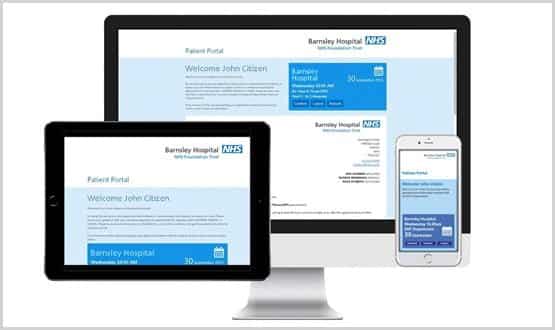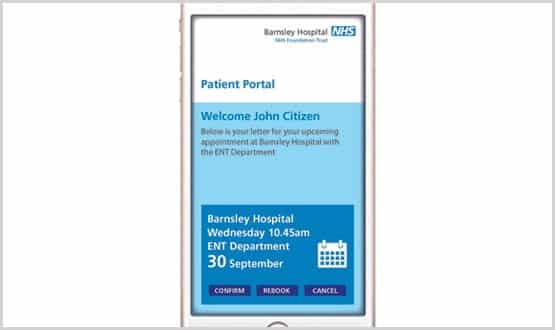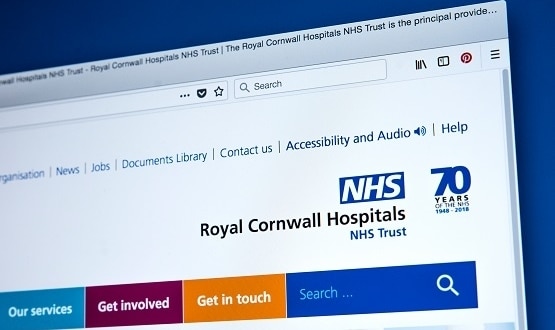Barnsley’s digital letters reduce missed appointments

The introduction of online appointment letters at Barnsley Hospital NHS Foundation Trust is being credited with a decrease in the number of patients missing appointments.
The trust officially deployed electronic outpatient appointment letters in June this year, allowing patients to receive the letters directly to their mobile phone.
About 40% of patients are using the digital service with Martin Ball, deputy head of procurement at the trust, hoping that number will grow to 60% within the year.
“So far the feedback has been really positive. If we can get to 50 to 60% of patients on the portal it would be really good”, Ball said. “It’s all about convenience for the patient and reducing DNA [did not attend] rates.
“Every time we get a missed appointment it costs the hospital about £160 but DNA rates have dropped about 4-5% which is big money saved.”
The new system allows patients to confirm, cancel or re-book their appointment with one click.
Once confirmed, the appointment can be added directly to the patient’s digital calendar which helps reduce the risk of forgetting their appointment. They can also save the letter to their phone or email it to print off.
Radiology and inpatients are next on the list for deployment, with full rollout of digital appointment letters set to be completed within the year.
“Sending a digital letter is up to 80% cheaper than the post equivalent and delivery is trackable”, points out Kenny Bloxham, commercial director at Healthcare Communications, the firm supplying the system at Barnsley and also patient communication software to more than 100 other trusts.

In recent years, many organisations have explored the use of technology to reduce DNAs and improve communication with patients.
Last year, Digital Health News reported on the introduction of a new digital booking system at Guy’s and St Thomas’ NHS Foundation Trust, which was expected to save the organisation the equivalent of £3.4 million a year.
The London trust is partnering with DrDoctor, who also introduced an SMS-based system at Heatherwood and Wexham Park Hospitals NHS Trust, enabling patients and receive and respond to appointment reminders via text.





14 Comments
Neil, good on you trying to get all your patients’ email addresses. But I feel that GPs should have help from above in the task of collecting them. NHSE or your CCG or EMIS et al should offer advice, help and perhaps software to acquire, amend, secure and manage email addresses. (Perhaps even the BMA could lend a hand.) There is about twenty years of experience out there in the real world of handling email systems. They will have solved Mary’s worries about people changing their email addresses.
I always ask myself why it is that GPs and hospitals cannot or will not communicate with me electronically, when my lawyer, financial advisor, MP, wine merchant, local restaurant, bank and supermarket do. All government departments have as a mantra “digital by default”. The NHS rule seems to be “paper and fax-machines” by default.
Richard, I am trying to collect the mobile numbers and email addresses of all my patients over 16yrs old. It takes ages, and the response rate to anything but face-to-face asking is poor.
Does Barnsley patient portal allow patients to amend their contact details? (which answers Mary Hawkings concern). I would say a trust/practice should give the patient methods of updating their contact details, via check in screens, patient portals or as a last resort – a receptionist.
Does Healthcare Communications/Barnsley intend to expand their patient portal product to add extra functionality (i.e. allow the patient to view their care record (either structured and/or accessing the document management system, complete assessment questionnaires, record access audit trail, etc).
Lastly, how is the patients appointment letter secured? Do they get given an access code in the sms/email and password to the portal?
I would be interested in stats on all of that??
Hi Tor,
With reference to queries above some of the points raised are commercially sensitive. Happy to discuss offline please contact me on mcunningham@healthcomm.uk.
In relation to the email queries, similar concerns were raised about mobile numbers 10 years ago , however the vast majority of us have kept our mobile numbers, with SMS / mobile contact now regarded as safe, as long as applied within the right context of patient communications (appointment reminders / GUM results / FFT surveys). Email is trickier however a similar pattern of people now keeping their email address is occurring , I think this lends itself to establishing preferences with various channels more suitable for the different communications. If you need to contact a patient quickly SMS / mobile is best , if it’s a more general notification then email will work. Email also has some IG issues as to where the data is going (outside EU etc) that does create additional barriers.
Richard, are there any figures on how often patients change their mobile phone numbers and/or email addresses?
When I was in practice – retired 31.3.13 – we used to check every phone number: it was surprising how often patients had changed their numbers without telling the practice…
Gosh, an NHS Trust is edging into the 21st century.
But, it’s going to be a long haul to get widespread use of hospital/patient ecomms.. I will begin to believe that the NHS is serious about digitalisation, when it becomes mandatory for hospitals and GPs to collect all patients’ email addresses. I suspect that that will take 5 years. Then it will take another 10 years for clinicians to come round to using them. This will put the NHS only about 50 years behind every other organisation in the world.
Interested in comments above, we knew after sending +300 million texts to patients they would read the invitation text. What we did not know was how many would log on to the Portal and use the digital letter, thus saving huge amounts of money on postal costs i.e recurring postal CIP savings. We have delivered high login rates, the rest is not new “digital” tech, just patient friendly use of existing channels.
I agree with Dan’s comments and would also say we can be 95%+ certain that reminding patients of appointments reduces DNA’s, giving patients portals to read their records and letters engages patients with their care and also reduces DNA’s.
We (/all trusts) shouldn’t need to provide studies, reports et al to try to convince the trust (ye olde staff) into modernising. By modernising I don’t mean the ‘bleeding’ cutting edge of tech, just what we would have expected ten years ago. We are wasting money and also not using IT to reduce costs.
This project is as much about reducing costs with digital communication supported by DNA improvement . To be fair the DNA Reduction via relevant appointment reminders SMS IVR agent etc is well established we work with 40 Trusts first SMS sent in 2005 , I do think most Trusts are doing some form now . We don’t see the requirements for case studies to progress an appointment reminder project to reduce DNAs that’s well established. The key to the success of this project has been the patient uptake . I m not surprised as per comments it’s not new tech and is patient friendly . It can become frustrating when another site requests a pilot , reducing benefits of cost / patient engagement really on offer as per Dans earlier comment .
Most GP practices send SMS reminders for surgery appointments, Seems to help.
It beats me why we need studies, we spent a few hours developing an SMS solution for reminders. Tried over a few weeks and results didn’t need a statis expert to decipher.
We should be asking why organisations are not doing it.
Empirical quantitative and qualitative data allows for further Trusts to build basic business cases to obtain relevant resources to implement the technology on their sites.
The NHS is quite arrogant in its approach. We’re so “different” and “special”…. We’re almost at the point where some people think we need to RTC email before we can possibly evaluate its effectiveness.
There is very little common or commercial sense applied, let alone taking very clear trends and evidence from other sectors. A clinician in one of the Royal Colleges stated that business cases are just fluff.
This is why we are so far behind in the NHS. There is no clear adoption path for technology, everyone is trialing and testing but no one is adopting at scale. Even if they are they are reinventing what someone has already done, which is nearly always the case if we look outside the NHS at other sectors.
If NHS organisations would just email me or send me a meeting request, we’d save a fortune on administration overhead and I am more likely to turn up and be prepared.
We don’t need special solutions to these problems, just to make use of the readily available technology we have.
And before the usual suspects do a dance around the IG pole – consent establishes the legal basis and if people still prefer receiving their correspondence via an unreliable and insecure postal system that’s fine, but let patients make an informed choice.
Comments are closed.